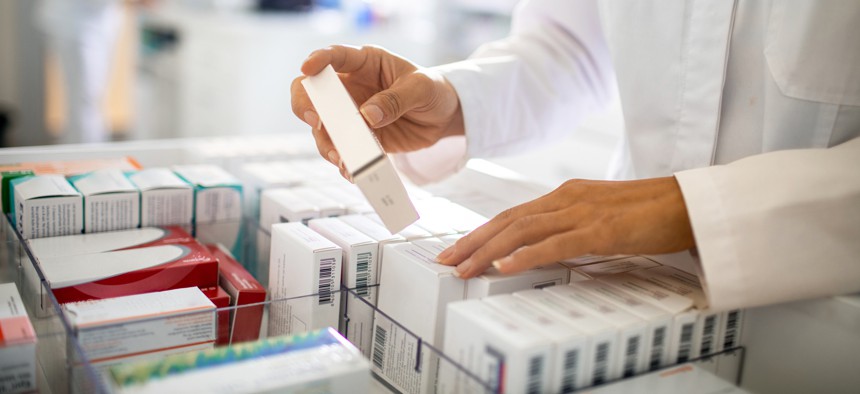Dispatch system streamlines delivery of addiction treatment meds

GettyImages/Marko Geber

Connecting state and local government leaders
A no-code workflow management system is helping Paterson, New Jersey, get addition treatment medication to patients within 90 minutes.
Officials in Paterson, New Jersey, used a no-code workflow management system to provide medication-assisted treatment (MAT) to people addicted to opioids within 90 minutes of their asking for it.
Paterson partnered with Quickbase for the pilot of RealFix, which is essentially a computer-aided dispatch (CAD) program that allows an operator to connect people in need of Suboxone, a drug that blocks opiates and eases withdrawal symptoms, to physicians, pharmacies and delivery companies.
“The problem in the industry has been that the medication to prevent withdrawal is not available on a timely basis. You have to wait at least a week to get it … and you have to travel to get it. It’s just ridiculous,” said Ed Boze, chief innovation officer for Paterson.
Studies have shown that MAT increases retention in treatment, decreases illicit opiate use and improves patients’ ability to gain and maintain jobs, according to the Substance Abuse and Mental Health Services Administration. But only 11% of the 2.7 million people with opioid use disorder received MAT in 2020, according to Pew. In fact, the most common treatment model is abstinence; fewer than a third of treatment centers use MAT.
In Paterson, five people overdose on opioids every day – 11% of them are homeless, making it difficult for them to get to MAT centers, Boze said.
Although “everybody is familiar with the opioid epidemic, that this is obviously an addiction … the problem we’re trying to solve, oddly enough, is a problem with customer service.”
All of the pieces of the solution – doctors available through telemedicine to prescribe Suboxone, pharmacists who can fill prescriptions and delivery companies – are available, but not coordinated.
“Our solution is really to manage those service providers using Quickbase to create [a kind of] computer-aided dispatch system,” Boze said.
The city has a cloud-based phone system through Grasshopper and a cloud-based CAD through Quickbase, which enabled operators to be able to take calls from anywhere that had an internet connection.
The city tested RealFix during two weekend evenings, when one telemedicine doctor saw about eight patients who called 1-833-REAL-FIX and told the operator that they needed MAT. Using Quickbase, the operator followed prompts through a decision tree that included collecting insurance information and alerting the doctor to the patient. The doctor called the patient to conduct an assessment and wrote the prescription, which he sent to a participating pharmacy and indicated within the workflow that the task was completed.
The operator then called the pharmacy to make sure the prescription was received and staff knew it was a priority. When the Suboxone was ready, the pharmacy alerted the operator, who contacted the delivery company.
A timer alerts the dispatcher when each step is completed – or if someone is taking too long. On average, medication was delivered in 76 minutes, Boze said, with the longest delivery taking 88 minutes.
“You have to live up to that promise [of delivering Suboxone within 90 minutes] because somebody that’s facing withdrawal is like, ‘OK, if you’re not really going to get this to me, I’m just going to go out and hit the streets and get opioids,’” he said.
The other part of the pilot involved helping addicts who are homeless. Rather than using telemedicine, the operator calls a nonemergency medical transport service, which picks the person up and takes them to an emergency department for medication and then to a shelter that has experience with people with addiction and that can connect them to inpatient treatment facilities.
The city views all of the data from the dispatches through Quickbase’s analytics tool. Officials can see that doctors took, on average, 30 minutes to assess patients or that certain pharmacies take longer than others.
“Innovation relies heavily upon iteration, so before we actually tried this live, we play-acted it,” Boze said. “Every time we play-acted, we needed to tweak.”
The data analysis and ability to make those tweaks himself were instrumental in the city winning a $1 million grant from Bloomberg Philanthropies in January. Paterson was one of 15 cities to win the 2021-2022 Global Mayors Challenge and only one of three in the United States.
The grant money will be distributed over three years, and Boze said he expects to get the first installment this month to begin putting the system in place and hiring people to work it. The plan is to start with two nights a week next month and increasing to round the clock over time. “The intent is to do that within Paterson, and then Passaic County and then for the state and then nationwide,” he said.
The city is also working with Rutgers New Jersey Medical School, which will get about 30% of the grant money to evaluate substance abuse treatment centers in the state. People who go through RealFix will also get treatment at vetted centers, Boze added.
The school already has experience in standing up large call centers, so when the system gets too big for the city to handle, Rutgers will take over.
Stephanie Kanowitz is a freelance writer based in northern Virginia.
NEXT STORY: The Deadliest US Metro Areas for Pedestrians




